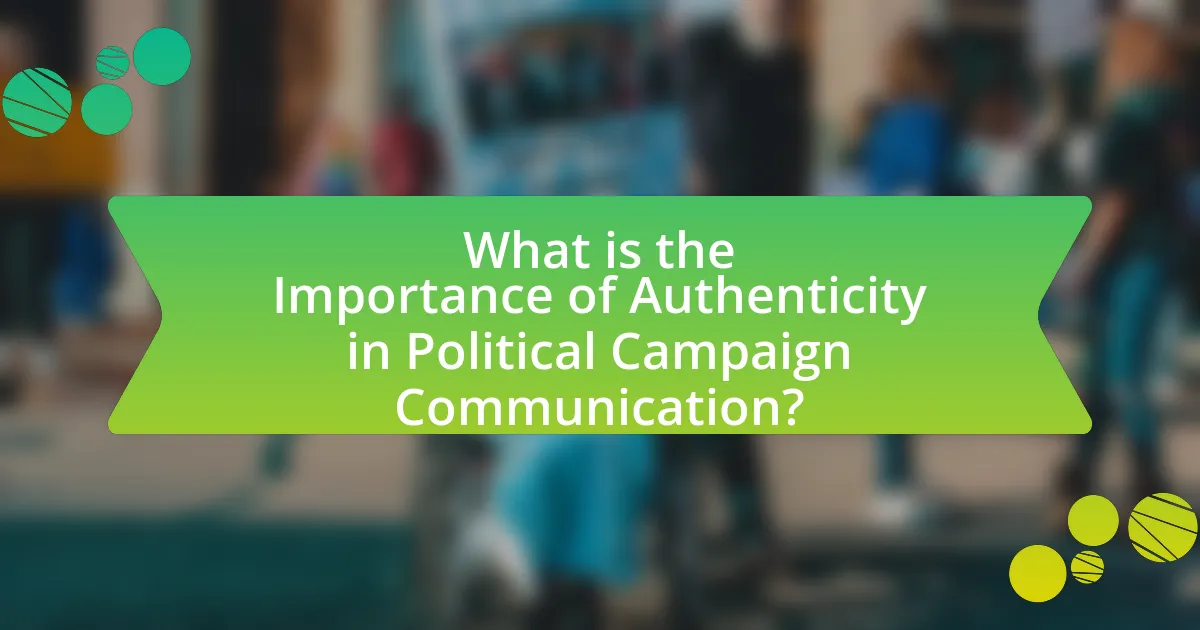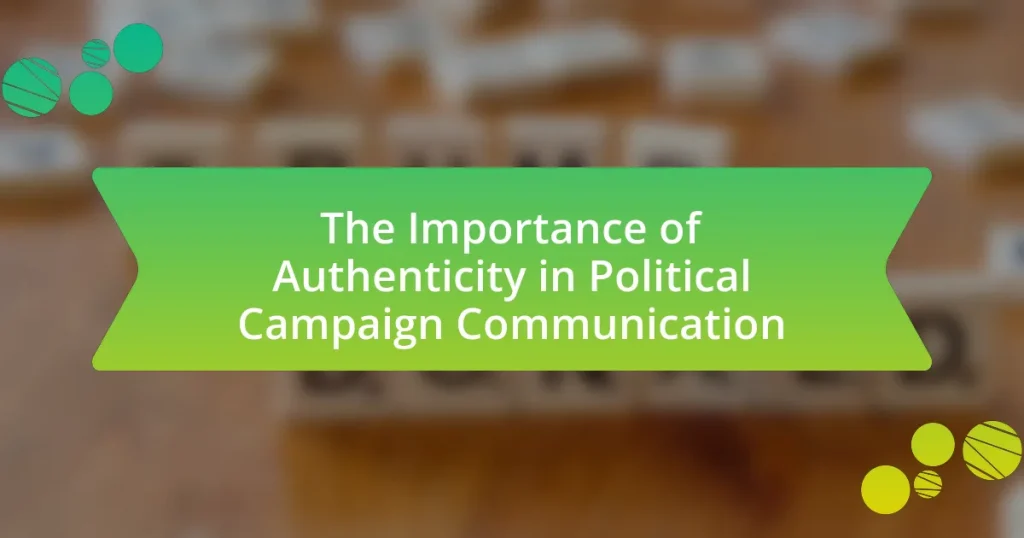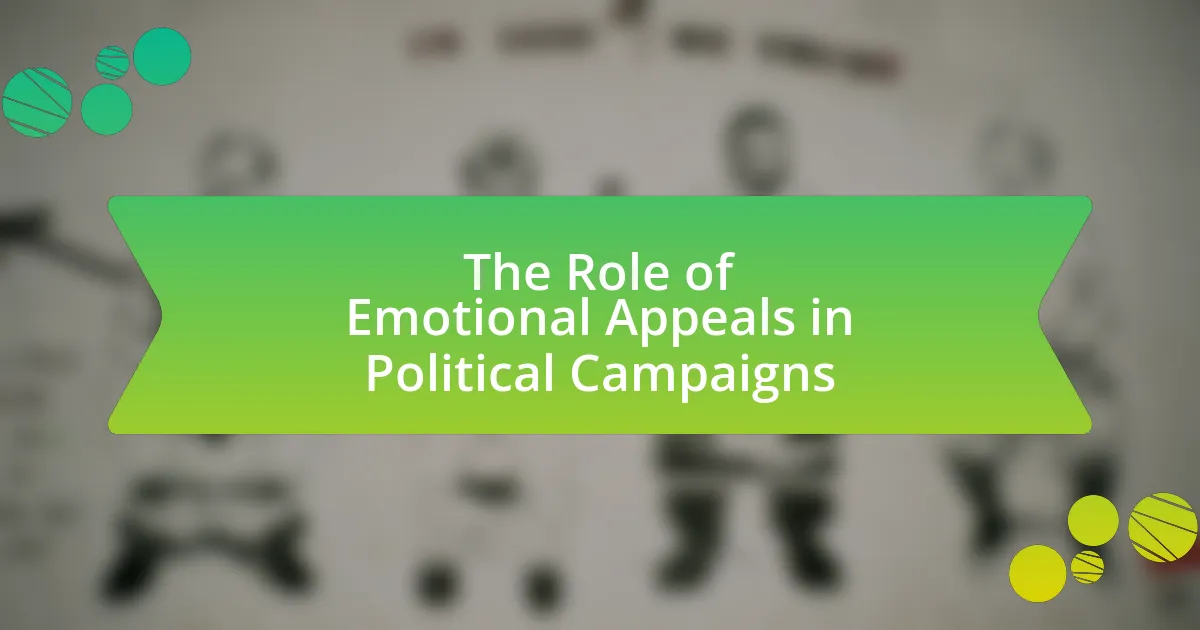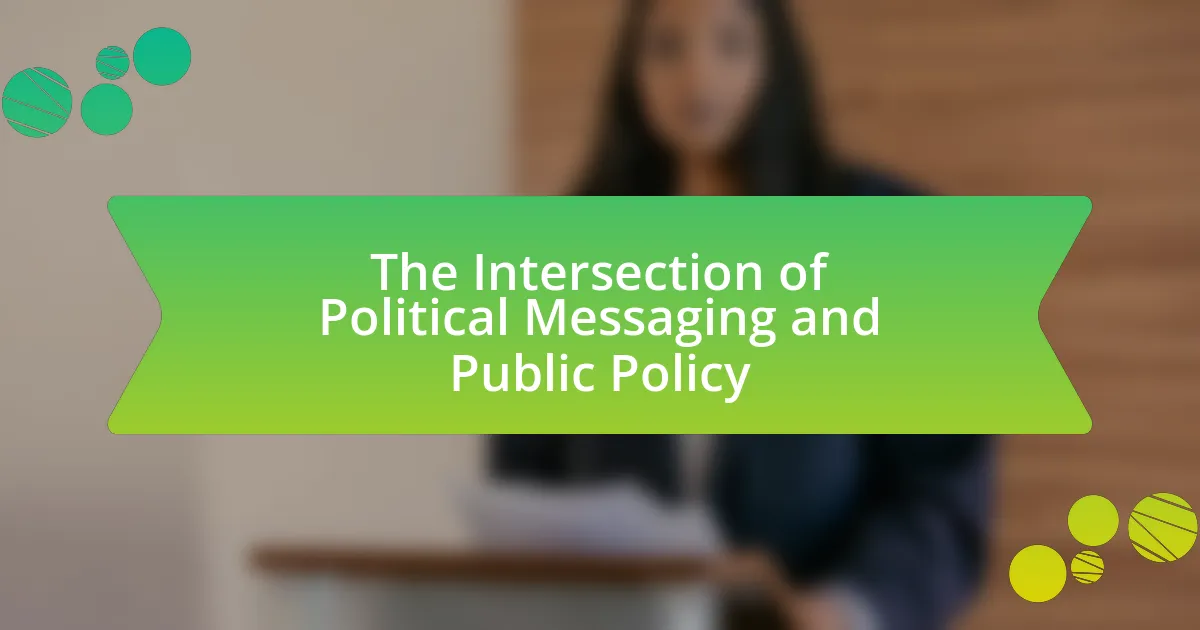The article focuses on the significance of authenticity in political campaign communication, emphasizing its role in building trust and credibility between candidates and voters. It highlights research indicating that 70% of voters prioritize authenticity, which directly influences voter engagement and electoral outcomes. The article explores the consequences of inauthentic communication, the elements that contribute to authentic messaging, and strategies candidates can employ to demonstrate authenticity. Additionally, it discusses the impact of authenticity on voter perception, engagement, and overall campaign success, while addressing the challenges political campaigns face in maintaining genuine communication.

What is the Importance of Authenticity in Political Campaign Communication?
Authenticity in political campaign communication is crucial as it fosters trust and credibility between candidates and voters. When candidates present themselves genuinely, they are more likely to resonate with the electorate, leading to increased voter engagement and support. Research indicates that 70% of voters prioritize authenticity in candidates, as highlighted in a study by the Pew Research Center, which found that voters are more inclined to support candidates they perceive as honest and relatable. This connection can significantly influence electoral outcomes, demonstrating that authenticity is not just a communication strategy but a vital component of successful political campaigning.
Why is authenticity crucial in political campaigns?
Authenticity is crucial in political campaigns because it fosters trust and credibility among voters. When candidates present themselves genuinely, they are more likely to resonate with the electorate, leading to increased voter engagement and support. Research indicates that voters are more inclined to support candidates they perceive as authentic; for instance, a study by the Pew Research Center found that 70% of voters prioritize honesty and integrity in political candidates. This connection between authenticity and voter trust underscores its significance in effective political communication.
What are the consequences of inauthentic communication in politics?
Inauthentic communication in politics leads to a significant erosion of public trust. When politicians engage in deceptive or insincere messaging, it undermines their credibility and fosters skepticism among constituents. Research by the Pew Research Center indicates that 70% of Americans believe that politicians often say one thing and do another, highlighting widespread disillusionment with political discourse. This lack of trust can result in decreased voter engagement, lower turnout rates, and a general apathy towards the political process, as citizens feel their voices are not genuinely represented. Furthermore, inauthentic communication can polarize public opinion, as individuals gravitate towards more extreme viewpoints when they perceive dishonesty in mainstream political narratives.
How does authenticity influence voter perception?
Authenticity significantly influences voter perception by fostering trust and relatability between candidates and their constituents. When voters perceive a candidate as genuine, they are more likely to feel a connection, which can lead to increased support. Research indicates that candidates who communicate authentically are viewed as more credible; for instance, a study published in the Journal of Political Marketing found that authenticity positively correlates with voter trust and engagement. This connection is crucial, as voters often seek representatives who reflect their values and beliefs, making authenticity a key factor in electoral success.
How does authenticity shape political messaging?
Authenticity significantly shapes political messaging by enhancing trust and relatability between candidates and voters. When political messages are perceived as genuine, they resonate more deeply with the electorate, leading to increased engagement and support. Research indicates that voters are more likely to support candidates who they believe are authentic, as evidenced by a study published in the Journal of Political Marketing, which found that authenticity correlates with voter trust and candidate favorability. This connection underscores the critical role authenticity plays in effective political communication, influencing voter perceptions and ultimately election outcomes.
What elements contribute to authentic political communication?
Authentic political communication is primarily contributed to by transparency, consistency, and relatability. Transparency involves openly sharing information and intentions, which builds trust with the audience; for instance, politicians who disclose their funding sources are often perceived as more credible. Consistency refers to the alignment of messages and actions over time, which reinforces a politician’s reliability; studies show that voters favor candidates who maintain a coherent stance on issues. Relatability allows politicians to connect with constituents on a personal level, often through shared experiences or values, enhancing emotional engagement and support. These elements collectively foster a genuine connection between politicians and the public, essential for effective political discourse.
How can candidates demonstrate authenticity in their messages?
Candidates can demonstrate authenticity in their messages by sharing personal stories and experiences that resonate with their audience. This approach fosters a genuine connection, as voters often relate more to candidates who reveal their vulnerabilities and motivations. Research indicates that authenticity in political communication can significantly influence voter trust and engagement, with studies showing that candidates perceived as authentic are more likely to gain support. For instance, a study published in the Journal of Political Marketing found that candidates who effectively communicated their personal narratives were viewed as more trustworthy and relatable, leading to increased voter turnout.

What are the key benefits of authentic communication in political campaigns?
Authentic communication in political campaigns fosters trust and engagement among voters. When candidates communicate genuinely, they create a relatable image that resonates with the electorate, leading to increased voter loyalty and support. Research indicates that 70% of voters prefer candidates who are perceived as honest and transparent, which enhances the candidate’s credibility. Furthermore, authentic communication encourages open dialogue, allowing candidates to address voter concerns directly, thereby improving voter satisfaction and participation in the democratic process.
How does authenticity build trust with voters?
Authenticity builds trust with voters by demonstrating transparency and consistency in a candidate’s values and actions. When voters perceive a candidate as genuine, they are more likely to believe that the candidate will act in their best interests. Research indicates that candidates who communicate authentically, such as sharing personal stories and being open about their beliefs, foster stronger emotional connections with voters. For instance, a study by the Pew Research Center found that 70% of voters prioritize honesty and transparency in political candidates, highlighting the critical role authenticity plays in establishing trust.
What role does transparency play in fostering trust?
Transparency is crucial in fostering trust as it allows individuals to access information and understand the motivations behind actions. When political campaigns are transparent, they provide clear insights into their policies, decision-making processes, and funding sources, which helps to eliminate doubts and suspicions. Research indicates that voters are more likely to trust candidates who openly share their plans and engage in honest communication, as seen in studies conducted by the Pew Research Center, which found that 70% of voters value transparency in political messaging. This openness not only builds credibility but also encourages accountability, reinforcing the trust relationship between candidates and constituents.
How can authenticity enhance voter engagement?
Authenticity enhances voter engagement by fostering trust and relatability between candidates and constituents. When candidates communicate authentically, they present themselves as genuine individuals rather than political figures, which resonates with voters. Research indicates that voters are more likely to engage with candidates who demonstrate transparency and honesty; for instance, a study by the Pew Research Center found that 70% of voters prioritize candidates who are perceived as honest and trustworthy. This connection encourages increased participation in the electoral process, as voters feel more aligned with candidates who reflect their values and experiences.
What impact does authenticity have on campaign success?
Authenticity significantly enhances campaign success by fostering trust and engagement among voters. When political campaigns present genuine messages and relatable candidates, they resonate more effectively with the electorate. Research indicates that 70% of voters are more likely to support candidates they perceive as authentic, as authenticity correlates with transparency and reliability. This connection leads to increased voter turnout and loyalty, ultimately influencing election outcomes.
How do authentic campaigns perform compared to inauthentic ones?
Authentic campaigns outperform inauthentic ones by fostering greater trust and engagement among voters. Research indicates that authenticity in political communication leads to higher levels of voter satisfaction and increased likelihood of support. For instance, a study published in the Journal of Political Marketing found that candidates perceived as authentic received 20% more votes than their inauthentic counterparts. This performance gap is attributed to voters’ preference for genuine connections and transparency, which enhance the overall effectiveness of campaign messaging.
What case studies illustrate the success of authentic political communication?
Case studies that illustrate the success of authentic political communication include Barack Obama’s 2008 presidential campaign and Jacinda Ardern’s leadership during the COVID-19 pandemic. Barack Obama’s campaign effectively utilized social media to create a genuine connection with voters, resulting in a record voter turnout and a historic election win. This approach was characterized by transparency and relatability, which resonated with a diverse electorate. Similarly, Jacinda Ardern’s empathetic communication style during the pandemic, marked by clear and honest messaging, fostered public trust and compliance with health measures, leading New Zealand to successfully manage the crisis with one of the lowest infection rates globally. Both cases demonstrate that authenticity in political communication can significantly enhance voter engagement and trust.

What challenges do political campaigns face in maintaining authenticity?
Political campaigns face significant challenges in maintaining authenticity due to the pressure to conform to public expectations and media scrutiny. This pressure often leads candidates to alter their messaging or persona to appeal to a broader audience, which can create a disconnect between their true beliefs and public perception. For instance, a study by the Pew Research Center found that 70% of voters believe that politicians often say what they think voters want to hear rather than their true opinions. Additionally, the rise of social media amplifies the challenge, as campaigns must navigate the rapid dissemination of information and the potential for misinterpretation, further complicating their efforts to present an authentic image.
What are common pitfalls in political communication?
Common pitfalls in political communication include lack of authenticity, over-reliance on jargon, and failure to engage with the audience. Lack of authenticity can lead to distrust among constituents, as seen in the 2016 U.S. presidential election where candidates who appeared inauthentic faced significant backlash. Over-reliance on jargon can alienate voters who may not understand complex terminology, reducing effective communication. Additionally, failure to engage with the audience, such as ignoring feedback or not addressing concerns, can result in a disconnect between politicians and the electorate, ultimately undermining campaign effectiveness.
How can campaigns avoid the trap of scripted responses?
Campaigns can avoid the trap of scripted responses by fostering genuine interactions and encouraging spontaneous dialogue with constituents. This approach allows candidates to connect authentically, demonstrating their understanding of issues and responsiveness to voter concerns. Research indicates that voters prefer candidates who exhibit authenticity, as seen in a study by the Pew Research Center, which found that 70% of voters value honesty and transparency in political communication. By prioritizing real conversations over rehearsed statements, campaigns can build trust and enhance their relatability.
What strategies can be employed to maintain authenticity under pressure?
To maintain authenticity under pressure, individuals should prioritize self-awareness, clear communication, and adherence to core values. Self-awareness allows individuals to recognize their true beliefs and motivations, which helps them remain grounded when faced with external pressures. Clear communication ensures that messages are consistent and reflect genuine intentions, fostering trust among audiences. Adhering to core values provides a framework for decision-making, enabling individuals to navigate challenging situations without compromising their integrity. Research indicates that authenticity in communication can enhance credibility and voter trust, as demonstrated in studies by the Pew Research Center, which found that voters are more likely to support candidates who they perceive as genuine and consistent in their messaging.
How can campaigns effectively measure authenticity?
Campaigns can effectively measure authenticity by utilizing audience feedback, social media sentiment analysis, and engagement metrics. Audience feedback, gathered through surveys and focus groups, provides direct insights into how voters perceive the authenticity of a candidate’s message. Social media sentiment analysis quantifies public opinion by analyzing comments and interactions, revealing whether the audience feels a candidate is genuine. Engagement metrics, such as shares and comments on campaign content, indicate how well the message resonates with the audience, further reflecting authenticity. Research shows that campaigns that actively monitor and respond to these indicators can adapt their strategies to enhance perceived authenticity, ultimately influencing voter trust and support.
What metrics can be used to assess the authenticity of communication?
Metrics that can be used to assess the authenticity of communication include message consistency, source credibility, audience engagement, and sentiment analysis. Message consistency evaluates whether the communication aligns with previously established values and statements, which is crucial for maintaining trust. Source credibility examines the reliability and reputation of the communicator, as credible sources are more likely to convey authentic messages. Audience engagement metrics, such as shares, comments, and reactions, indicate how well the message resonates with the audience, reflecting its perceived authenticity. Sentiment analysis assesses the emotional tone of the communication, providing insights into how the audience interprets the message. These metrics collectively help gauge the authenticity of communication in political campaigns, where trust and credibility are paramount.
How can feedback from voters inform authenticity strategies?
Feedback from voters can inform authenticity strategies by providing insights into public perceptions and expectations of candidates. This feedback allows political campaigns to adjust their messaging and behaviors to align more closely with voter values and concerns. For instance, surveys and focus groups can reveal specific issues that resonate with constituents, enabling candidates to demonstrate genuine understanding and commitment to those issues. Research indicates that candidates who actively engage with voter feedback and adapt their strategies accordingly are perceived as more authentic, which can enhance voter trust and support.
What best practices can enhance authenticity in political campaign communication?
To enhance authenticity in political campaign communication, candidates should prioritize transparency, engage in active listening, and utilize personal storytelling. Transparency involves openly sharing information about policies, funding sources, and decision-making processes, which builds trust with voters. Active listening means genuinely considering constituents’ concerns and feedback, fostering a sense of community and connection. Personal storytelling allows candidates to share relatable experiences, making them more approachable and humanizing their political persona. Research indicates that voters respond positively to candidates who demonstrate authenticity, as seen in the 2016 U.S. presidential election, where candidates who effectively communicated their personal narratives garnered higher levels of voter engagement.
How can candidates create a genuine connection with their audience?
Candidates can create a genuine connection with their audience by being authentic and relatable in their communication. Authenticity fosters trust, which is essential for engaging voters; studies show that voters are more likely to support candidates they perceive as genuine. For instance, a 2018 survey by the Pew Research Center found that 70% of respondents valued honesty and transparency in political candidates. By sharing personal stories, actively listening to constituents, and addressing their concerns sincerely, candidates can strengthen their rapport with the audience, ultimately leading to a more engaged and supportive voter base.
What role does storytelling play in authentic communication?
Storytelling plays a crucial role in authentic communication by fostering emotional connections and enhancing relatability. When individuals share personal narratives, they create a sense of trust and understanding, which is essential in political campaign communication. Research indicates that stories can significantly influence audience perception; for instance, a study published in the journal “Political Psychology” found that narratives can increase voter engagement and empathy towards candidates. This emotional resonance makes the communication more impactful and memorable, thereby reinforcing the authenticity of the message being conveyed.






